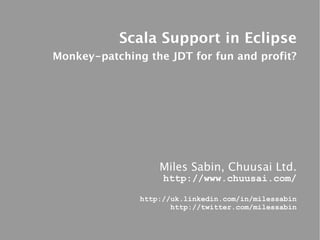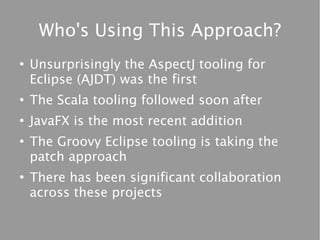Eclipsecon 2010 - Scala Support in Eclipse
- 1. Scala Support in Eclipse Monkey-patching the JDT for fun and profit? Miles Sabin, Chuusai Ltd. http://www.chuusai.com/ http://uk.linkedin.com/in/milessabin http://twitter.com/milessabin
- 2. Outline ● JVM Languages Need Java-level Tools ● The Scala IDE for Eclipse ● History ● How to Move Forward? ● AspectJ and Equinox Aspects ● Who is Using This Approach? ● Retrospect and Prospects
- 3. The Need for Java-level Tools ● Many of the new JVM Languages offer significant productivity gains over Java, but ... ● Mainstream adoption requires improvements across the entire toolchain ● A x2 productivity gain at the language level is irrelevant if there's a /2 loss at the tool level ● Especially so for IDEs
- 4. The Need for Java-level Tools ● A subset of JVM languages are also “Java- compatible” ● Close source and binary mapping to Java – Scala, Groovy, JavaFX, AspectJ ● This holds out hope that many Java tools will Just Work, or work with minor adaptation ● eg. Java annotation driven tools generally work as expected with Scala ● Additional promise of gradual migration
- 5. The Need for Java-level Tools ● Does this carry over to IDEs? ● On the positive side there is much common infrastructure across languages – This is reflected in IDE extension APIs ● Buts it's not enough to provide orthogonal support – Gradual migration demands that major features of the Java tooling be aware of new language artefacts ● The big value features are the ones which are informed by language semantics – Typically private to IDEs language tooling
- 6. The Scala IDE for Eclipse ● The Scala tooling for Eclipse is an attempt to answer the preceeding question in the positive ● The aim of the project is to achieve tooling which approaches that of the Eclipse JDT but with vastly less effort
- 7. History 1 ● Started very early on in Scala's timeline (early 2005) ● Very simple IDE plugin ● Little functionality beyond basic syntax highlighting and build invocation ● Written in Java ● There was a least one other similar offering at the time: Scaliptor
- 8. History 2 ● Announced December 2005, first release February 2006 (2.1.0) ● Rewritten in Scala ● Some semantic features acquired (eg. limited auto-completion) ● Even at this early stage requests for the ability to mix Java and Scala and JDT interop were coming in
- 9. History 3 ● Announced June 2007, first release February 2008 ● Attempted much deeper integration with the Scala compiler, ● Interactive error reporting ● Semantic highlighting ● Incremental compilation ● Dependency management ● Many hooks added to scalac
- 10. History 4 ● Start of my involvement (May 2008) ● Prompted by very generous sponsorship by EDF Trading ● Primary goals ● Ease Java/Scala migation – Mixed Scala/Java compilation in scalac – Mixed Scala/Java projects in Eclipse ● Improved Eclipse stability and release process
- 11. History 4 ● First commit to trunk in July 2008 ● Results of the work first visible in 2.7.2.RC1 in August 2008 ● Final 2.7.2 release in November ● Goals somewhat met, ● Mixed Scala/Java enabled in scalac and Eclipse ● Release process dramatically improved ● However JDT integration limited and stability issues remain
- 12. How to Move Forward? ● Various non-options ● Fork Eclipse? – It's open source, but too big and too rapidly changing. Maintaining a a patch against it would be a huge effort – We want users to be able to install our tools into their existing eclipse environments – If several JVM languages fork the JDT which one wins?
- 13. How to Move Forward? ● Various non-options ● Lobby for extensions to the JDT? – Andrew Eisenberg's patch has been languishing in Eclipse Bugzilla for 3+ years – JDT team understandably reluctant to see private implementation exposed as public API – Alternative JVM languages still a minority interest, so little business motivation to make the change ● Fortunately AOP provides us with a Plan B
- 14. AspectJ and Equinox Aspects ● AspectJ is a well-know AOP extension to Java ● Allows behaviour of existing Java classes to be modified – Pointcuts specify slices through execution flow – “Advice” is code which is executed before, after or completely replacing original specified by pointcuts
- 15. AspectJ and Equinox Aspects ● Opinions are divided on AOP ● There are some compelling use cases – Logging, error handling – These cases are typically passive and observational ● Aspects can also actively modify behaviour, but – It's a gross violation of encapsulation – It can obscure the flow of execution ● Violating encapsulation is a bad thing ... – ... except when that's exactly what you need to do! – In which case AOP is an industrial strength tool
- 16. AspectJ and Equinox Aspects ● A collection of aspects is effectively a patch ● AspectJ was used to retrofit the desired extensibility features to the JDT and expose them via public API ● The key modification: ● The JDT's CompilationUnit is the entry point to it's internal model, but it assumes Java source ● An aspect can turn its constructor into a factory method
- 17. AspectJ and Equinox Aspects ● One more piece of the puzzle ● How to get these aspects applied to an Eclipse Installation? ● We can't require a custom Eclipse build or we're back to square one ● Enter Equinox Aspects ● Work of Martin Lippert ● An OSGi framework extension supporting the weaving of aspects into binaries at load time
- 18. Who's Using This Approach? ● Unsurprisingly the AspectJ tooling for Eclipse (AJDT) was the first ● The Scala tooling followed soon after ● JavaFX is the most recent addition ● The Groovy Eclipse tooling is taking the patch approach ● There has been significant collaboration across these projects
- 19. Retrospect and Prospects ● The results are a qualified success ● But the patch was premature, ● Experience has shown that although the initial round of JDT modifications removed the biggest hurdles, – There are still many scenarios where Java source assumptions are made – The retrofitted public API maps JVM language constructs to the JDT's model in a way which best fits Java extensions rather than new languages
- 20. Retrospect and Prospects ● More cross-language collaboration needed ● We need to draw on the experiences of the various groups and factor out common API and functionality ● We need to encourage other languages to follow, esp. languages not so close to Java ● We need to work with the JDT team to roll these changes into Eclipse
- 21. Demo
- 22. Find Out More ● Scala's home at EPFL http://www.scala-lang.org ● See also the scala-user and scala-tools mailing lists ● Scala IDE installation http://www.scala-lang.org/node/94 ● Update site for 2.8.0 Beta 1 http://www.scala-lang.org/ scala-eclipse-plugin-beta-preview
- 23. Scala Support in Eclipse Monkey-patching the JDT for fun and profit? Miles Sabin, Chuusai Ltd. http://www.chuusai.com/ http://uk.linkedin.com/in/milessabin http://twitter.com/milessabin























